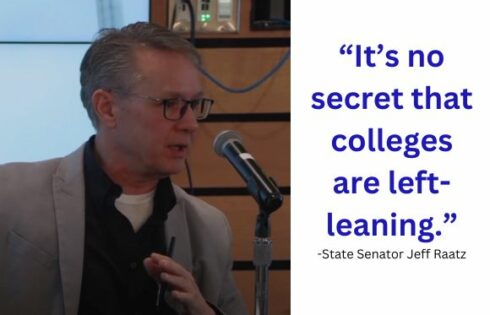
Could represent ‘new wave of state-level legislation directed toward reforming public universities’
Each of Arizona’s public universities would have to set up a new “Office of Public Policy Events” to promote intellectual diversity on campus, according to a bill recently introduced in the state legislature.
“The bill is necessary because we want to educate our students,” said Republican State Rep. Anthony Kern, the bill’s author, in an interview with The College Fix. “We want to give them a well-rounded education, not a one-sided one, whatever that side may be.”
The bill calls for the public policy offices to “organize, publicize and stage debates, group forums and individual lectures that address, from multiple, divergent and opposing perspectives, an extensive range of public policy issues that are widely discussed and debated in society at large.”
The offices would “prioritize inviting speakers from outside the university who hold perspectives on widely debated public policy issues that are otherwise poorly represented on campus.”
“If we’re going to educate young minds, and get them ready for the real world, we need balanced views,” Kern said. “Students need civil discourse and thought.”
Media affairs representatives from the University of Arizona and Arizona State, the two largest public universities in the state, did not respond Tuesday to a request for comment on the bill.
Stanley Kurtz, a senior fellow at the Ethics and Public Policy Center, argues in National Review the bill could represent a “new wave of state-level legislation directed toward reforming public universities.”
Last year, Kurtz authored a model campus intellectual diversity act that served as inspiration for the Arizona legislation. He writes that similar bills in other states are soon to follow, and adds he is cautiously optimistic about the effort in the longterm.
“Just putting the issue on the table is a big step. Filing a bill sets off debate and builds attention and support. It’s not uncommon for it to take more than one legislative cycle for a new idea to get serious traction. We’ll see what the future holds. With Anthony Kern’s introduction of HB 2238, however, the idea of bringing greater intellectual diversity to our public university systems has taken a very big step forward,” according to Kurtz.
Kern said Kurtz had approached him with the bill idea in early 2019, and he decided to introduce it as legislation in 2020.
“We need to educate students and give them a balanced view and prepare them for the real world,” Kern told The Fix. “… A lot of these college campuses, with social justice programs and all that, there’s one view being elevated and one view being put down.”
The bill calls on each public policy office to collect data on all guest speakers on college campuses (except for those sponsored by off-campus groups in rented facilities).
“And by collecting that data, we can go ahead and make informed decisions down the road on educating our students,” he said.
“We’re not looking to expand government, this data isn’t hard to collect,” said Kern, noting that the data collection job could likely be absorbed in any number of university offices.
Emory University Professor Mark Bauerlein, a proponent of the effort, pointed out in Minding the Campus that the offices would not “touch what professors do in the classroom. … The proposal aims only at open campus events.”
“It is hard to imagine any reasonable objection to such a proposal,” Bauerlein wrote. “Professors who decry such initiatives as a form of political interference in academic matters have long discredited themselves on the issue. They are the ones most responsible for having manufactured the biased and irrational atmosphere in the first place. Besides, why should teachers disallow a richer intellectual climate from forming? If they do, they are proselytizers, not instructors?”
In recent years, Arizona lawmakers have intervened to create more conservative-oriented offices on Arizona’s largest campuses, including the School of Civic and Economic Thought and Leadership at Arizona State University and the Department of Political Economy and Moral Science at the University of Arizona. Both offices have come under fire from progressives for accepting funds from the libertarian-aligned Charles Koch Foundation.*
Kern praised both offices, noting they are dedicated to giving a two-sided view on every issue.
But Kern said more is needed to codify ideological balance on campuses around the state. Kern, who has previously introduced a bill to eliminate campus “free speech zones,” sees his new bill mandating balance on campus to be the next step in the progression of liberty on campus.
“The narrative out there is that college campuses are indoctrinating students to the left,” Kern said. “It’s a free speech issue – I’m not looking to squelch leftist views at all. Because we’re America and our First Amendment says we have freedom of speech.”
“This is a college campus, taxpayer-funded state-run university. I’m a conservative, and I don’t want kids being taught leftist doctrine in our universities,” he said. “My tax dollars are not being represented.”
Kern told The Fix he thinks the bill has “got a great chance” of passing.
“We all should be promoting the free speech cause, whether you’re left or right,” he said, arguing students should “not be afraid of the speech police.”
MORE: University of Arizona denies ‘official’ relationship with trans-hippo visiting scholar
IMAGE: Shutterstock.com
Like The College Fix on Facebook / Follow us on Twitter





Please join the conversation about our stories on Facebook, Twitter, Instagram, Reddit, MeWe, Rumble, Gab, Minds and Gettr.